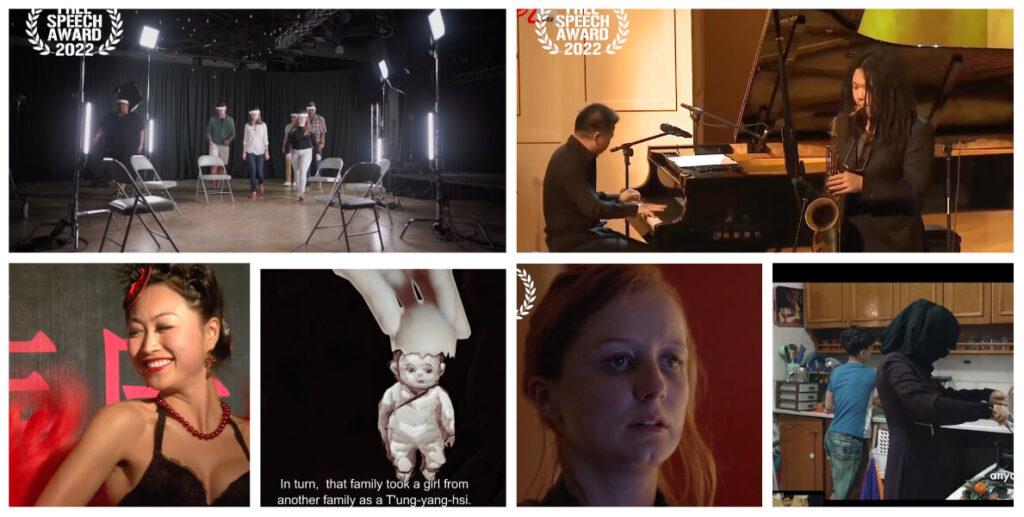The annual American INSIGHT Free Speech Film Festival in Philadelphia invites filmmakers from around the world to submit work that considers and deepens our understanding of “free speech, human rights, and the rule of law.”
This year’s official selections include documentaries about the political climate on college campuses; jazz — that music that always wants to be free — in China, which is cracking down hard on ethnic minorities and returning to pandemic lockdowns; the plight of refugee women in Turkey; and a groundbreaking burlesque dancer. An animated film about T’ung yang hsi, a traditional East Asian practice of arranged marriage, is also included, as is a (fictional) short about the intimidation of a female journalist who exposes human rights abuses at an ICE detention center.
Submissions are narrowed down to a slate of official selections that vie for the Free Speech Award, which comes with cash and the spotlight treatment on INSIGHT’s website and social media channels. (Festival producer Margaret Chew Barringer declined to choose a favorite when I spoke with her about the festival, but I’m going with the persecuted journalist.) The films can be previewed now on INSIGHT’s website.
Freedom of speech is one of the most treasured of the rights we Americans claim, but what exactly it constitutes is a question Barringer’s husband asked her quite pointedly some years ago. Barringer, a poet, answered artfully: “It’s life,” she told him. “It is the essence of life.”
Barringer is excited to announce a winner in Philadelphia at the historic Cliveden of the National Trust on November 19. (Cliveden, also known as the “Chew House,” was named after Barringer’s ancestor, Benjamin Chew. It has housed seven generations of Chews.) The daylong celebration will include a screening of the winning film and a discussion with the filmmaker.
Freedom of speech is one of the most treasured of the rights we Americans claim, but what exactly it constitutes is a question Barringer’s husband asked her quite pointedly some years ago. Barringer, a poet, answered artfully: “It’s life,” she told him. “It is the essence of life.”
When we fail to protect freedom of speech, we deprive ourselves and others of that crucial essence. Barringer’s journey to protect the voices and lives of others started in the 1950s on a dairy farm in Wayne, PA, where she was free to explore: She lived the kind of idyllic childhood that involved playing in the woods, reading books, and summer trips to museums and historical sites. She began writing poetry in high school, a habit that would inform her life.
Barringer left the farm and moved in the 1980s to Philadelphia, where she founded the American Poetry Center with Steve Berg, co-founder of the American Poetry Review (APC), in 1983. At APC, she helped disseminate spoken word works to broad swathes of people. “Spoken word,” Barringer says, “is free speech coming off the page and out of academia and into bars and onto street corners.”
Barringer saw in the digital world an opportunity for further expression of ideas. She made films about her friend, artist Robert Indiana, and Philadelphia-born Modernist painter Arthur Beecher Carles. At a screening for the latter film, an audience member suggested a possible next subject for Barringer: Violet Oakley.
A painter and illustrator who received some of her training at the Pennsylvania Academy of the Fine Arts and Drexel University, Oakley is credited as the first American woman commissioned as a muralist. From 1905 to 1930, she painted a series of 43 murals in the Pennsylvania State Capitol Building in Harrisburg within rooms for the Governor’s Reception, the Supreme Court, and the Senate. The murals obsessed Barringer, specifically those that depicted the path of free speech from Europe across the Atlantic with William Penn to the shores of what would become Pennsylvania. Persecuted as a Quaker in England, Penn’s journey was an early experiment in the sorts of freedoms that would be codified in the First Amendment.
Oakley and Penn are but two figures who’ve captured Barringer’s imagination and cemented a belief that she is “fated” to explore and promote the notion of freedom of speech. “I didn’t understand it, but the older I get the clearer it becomes,” she says.
In 2005, APC became American INSIGHT, an organization focused on the history and values of freedom of speech, which offers educational programming through coursework as well as the film festival. Barringer says it’s the work she’s been doing since the 1980s — and the work her ancestors did around the fire, nurturing the instinct to tell stories as a means of survival. And today, when facts are up for debate and history books are being banned, burned, and rewritten, this isn’t just flowery, poetic speech; it’s essential.
I imagine Barringer’s journey as its own mural that begins with a girl on a farm and progresses into scenes crowded with the poets and filmmakers whose words saw the light of day because of her commitment to free speech. The mural, of course, is not complete. There’s a lot of blank wall for the rest of us to fill.
This article is in RQ’s Fall 2022 issue, “Failure.” Subscribe to Root Quarterly here.

